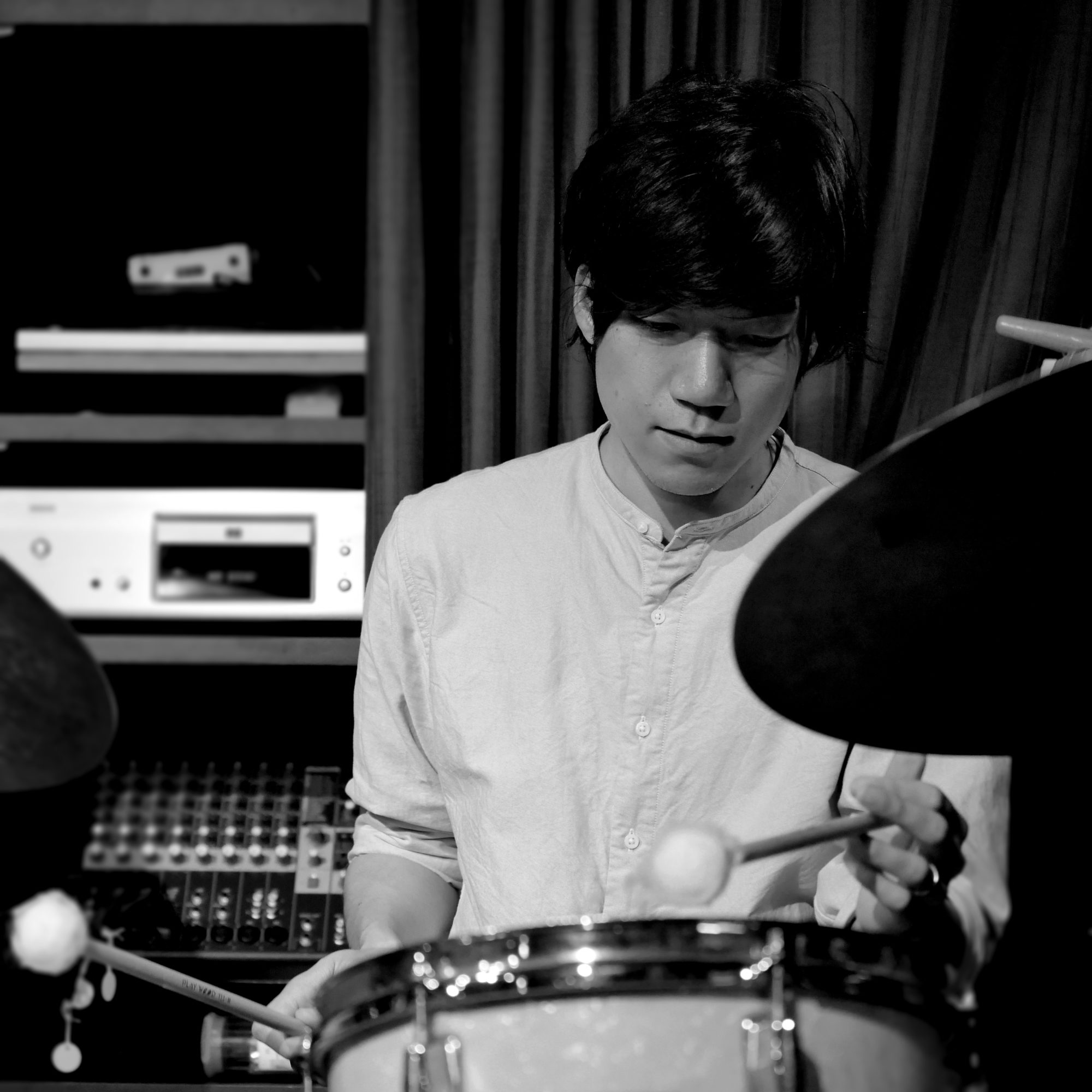さいきんめっきり涼しくなって夏が終わったなと実感しています。
この夏は自分の中でなんというかいろいろあった。
なんか不思議な夏だった
今考えてみると。
僕のとった行動がよかったのかどうだったのか
わからないけど
自分に正直でいられた事は
よかったんだと思う
NYの短い秋を楽しみたいと思います。

Welcome to the website of drummer Ryo Noritake
さいきんめっきり涼しくなって夏が終わったなと実感しています。
この夏は自分の中でなんというかいろいろあった。
なんか不思議な夏だった
今考えてみると。
僕のとった行動がよかったのかどうだったのか
わからないけど
自分に正直でいられた事は
よかったんだと思う
NYの短い秋を楽しみたいと思います。
最近の出来事を書いてみます
今日ようやく家でネットが使えるようになりました。
なくても何とかなる気もする反面、やっぱりないと困る部分もありますね。
学校も9/1から早速始まり片道約2時間かけて地下鉄とバスで通ってます。
今のところ週4なんだけどうまくいけば週3になりそう。そうなるとだいぶ助かる。
ここ何日かはまた少し暑かったんだけど、今日授業が終わってバスが来るのを待っているときけっこう肌寒くて、夏が終わったな〜って感じました。夕焼けが綺麗でした。2010年の夏はなんだか不思議な夏でした。
昨日StoneにJoey BaronとBill Frisellのduoを見に行きました。約1時間くらい前についたんだけどすでに行列が。。。最後の4人か3人かそのくらいでなんとか入れました。以前 Cuong Vuを見に行って満席だった時の記憶が沸々とよみがえり、これはめちゃくちゃ暑くなるなと覚悟してたけど、本当にすごかった。あんなに汗をかきながら誰か の演奏聞いたの初めてなんじゃないかな。
内容は言うまでもないでしょう!
ふたりともいろんな枠を越えてぶっとんでました。
そもそも二人には枠なんて初めからなかったのかもしれないけど
そしてこの二人のduoを聴きにこれだけたくさんの人が集まるという事実が、なんか僕にとってはすごく嬉しかったしNYってすごいなと思いました。
遠く日本にいる友へ
この夏は移動中ずっとmoleskineのメモ帳みたいのに日記を付けていたので、今日はそれを普段つけている5年日記に書き写すという作業をした。別にしなくてもいいんだけど、これをしないと時間が先に進まないような気がして。(5年日記は分厚くて重く、持ち運びには適さないので常に名古屋の家においていた。)
それほど時間は経っていないのに、読み返していると移動距離が長かったせいか、これがあったのがこの日の翌日だったんだという事がたくさんあった。
時間の流れってやっぱり相対的なもので、個人の主観で速度が変わるものなんだなと思った。
あと2セメスター、実質的には1年もない。
正直、いまの “学校” から学位と頭でっかちになる知識以外に何かを得られるのか相変わらず不安だけど、心を閉ざさないようにしてれば1年目みたいにまわりの学生達やミュージシャンからいろいろ吸収できるんだと思う。とても楽しみ。九月から変わる住環境もきっと僕の生活にいい影響をもたらしてくれるはず。
僕にとって卒業までのあと9ヶ月がどんな速度で過ぎていくかはまだわからないけど、できることをしっかりしてできないことにも挑戦して充実させていこうと思います。
———-
長くなるけど、水曜日にTyshawn Soreyのグループを初めて観た。僕にとっていままでに聴いた事のないような音楽で自分の中にスッと入ってこなかった。悪い意味ではなく、いい意味で。
こんな聴いたことないような新しい事してるなんてすごいなと思った。また是非見たい。
僕の最近の音楽は、自分や聴き手の心の中の、懐かしさを感じる部分、それこそ原風景みたいなものを大事にしていく音楽だけど、それとはまったく逆の視点から音楽してるのがとても新鮮で羨ましかった。
それってとても勇気がいる事だけど、そうやって先に進んでいくんだよな、何事も。
昨年の夏にNYで録音した、Daniel MeronのDirectionsというCDがall about jazzというサイトでレビューされました。今までは本人から直接しか買えなかったのですが、今後はamazonとかiTunesでも入手できるようになるようです。
詳しくはhttp://www.danielmeron.com/へ。
レビューの本文を掲載します。
英語ですが、、
By Bruce Lindsay
Pianist/composer Daniel Meron makes an emphatic debut with Directions, a quintet album of stylish and original tunes. Meron grew up in Israel and was appointed Chief Musical Arranger to the Israeli military’s performance troupes during his service. It’s an unusual apprenticeship for a jazz musician, but on the evidence of this album it’s an effective one. A scholarship to Berklee College in 2007, where he was taught by Greg Osby and Joe Lovano, was followed by a move to New York where Directions was recorded in June 2009.
Meron’s arrangements create a full and rich sound. As a writer, Meron produces some beautiful themes and melodies; as a player, he has a crisp, strong, style that enables him to move readily from warm, engaging ballads to fast, hard bop, passages with apparent ease. There are phases of forceful, almost aggressive playing but, for the most part, Directions is defined by a melodic, lyrical, style that is immediately engaging. Drummer Ryo Noritake is always to the fore and plays a major role in setting the album’s mood—even though, on occasion, his cymbals threaten to overwhelm the lead instruments while, by contrast, Noam Wiesenberg’s bass sometimes sits too far back in the mix.
“Battle for Independence” begins with a brief but emphatic horn phrase; a reference, perhaps, to Meron’s military experience. This phrase and the hard-edged, combative horns of saxophonist Jesse Scheinin and trumpeter Jeremy Sinclair are powerful but somewhat untypical of Meron’s writing. “Ad” has more of a classical feel—a smooth, reflective, piece characterized by the tidal wash of Noritake’s cymbals and Meron’s delicate piano; also featuring a gently restrained duet between Sinclair and Scheinin. “Paint the Tonic” is an up-tempo tune that starts life with a playful, jagged, piano solo, while “Nature Reaction” has elements of funk and even a hint of a Latin influence.
“Rushed In” is a trio number: a swinging, joyous, tune to close the album. Meron is at his finest here, delivering a sparkling performance. Wiesenberg is also at his best: his bass sits higher in the mix, as it deserves to do, and his solo is strong and assured. “Backwards” features more of the impressively assertive horns of Scheinin and Sinclair, but here they play with each other, rather than in the apparent competition of “Battle for Independence.”
The most impressive tune is “Bombay,” a trio performance on which Meron’s piano sound is crystal clear, precise and beautiful. The piece builds slowly, ebbing and flowing between slow, spacious passages and periods of real tension—the changes driven especially by Noritake’s cymbal playing. Gorgeous.
Directions may be a debut album, but has a maturity and a sense of originality that many more established artists would envy. Meron is a talented writer, arranger and musician and the quintet plays with empathy as well as skill. There is a real beauty and humanity in this music.